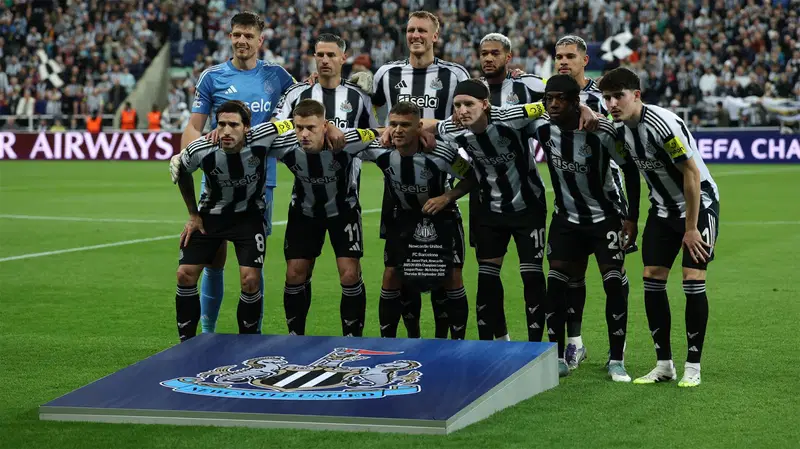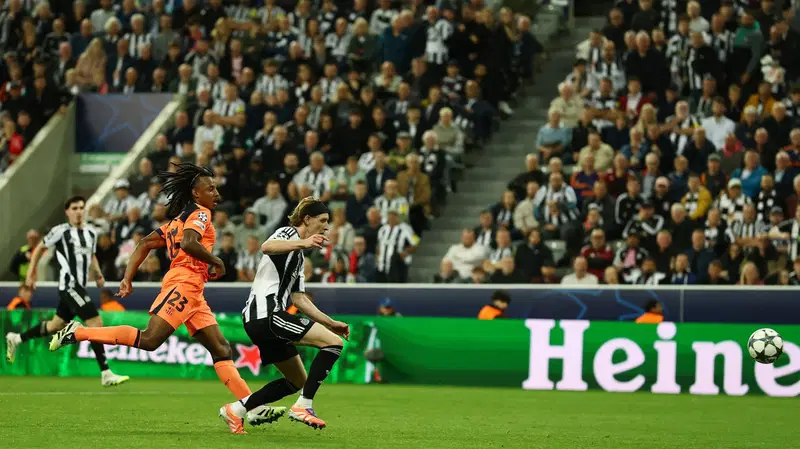In the world of modern football, few things are as fickle as fan opinion. A manager can go from being an untouchable hero to facing intense scrutiny in the blink of an eye.
For a long time, Eddie Howe existed in that first category for Newcastle United supporters. He was the man who had orchestrated a remarkable turnaround, delivering Champions League football and, most importantly, ending a 56-year wait for a major trophy.
His achievements were made even more impressive by the fact he did it while navigating three consecutive transfer windows without being able to add a single new first-team player, a testament to his coaching ability and the spirit he instilled in the squad.
Yet, as the final whistle blew on a narrow 2-1 Champions League defeat to Barcelona, a familiar and frustrating narrative began to emerge in some corners of the fanbase.
The very same manager who had been praised for his tactical intelligence was now being questioned for his team selection and in-game decisions.
This is, of course, part of the natural rhythm of football fandom. Every single person in the stadium, and millions watching at home, has their own idea of what the perfect lineup or the perfect substitution would be.

It’s a conversation that fuels pubs and social media platforms, and it’s done with a sense of passion and love for the club.
However, there is a significant difference between respectful debate and outright condemnation. The problem arises when a subset of supporters, often amplified by certain media voices looking for a reaction, claim that the manager’s decisions were not just debatable, but were glaringly obvious errors that single-handedly cost the team the match.
This reaction tends to ignore the complex reality of a football match, where fine margins, individual moments of brilliance, and plain luck often decide the outcome.
The criticism after the Barcelona game largely focused on the decision to start Harvey Barnes and use Anthony Gordon through the middle, rather than beginning with new striker Nick Woltemade.
The argument was that Woltemade’s physical presence would have been better suited to attack the numerous crosses into the box. In hindsight, it’s easy to make that case.
But Eddie Howe’s reasoning was rooted in a clear tactical plan. He wanted to utilize the blistering pace of Gordon and Anthony Elanga to press Barcelona high up the pitch and launch rapid counter-attacks.

This strategy very nearly worked on several occasions in the first half, with both players creating golden opportunities that, on another night, would have been finished.
The plan was almost certainly what Howe had envisioned all along, but it was forced to change due to the injury to Yoane Wissa.
The ideal scenario would have seen Wissa leading the line with Gordon and Elanga providing the speed on either side. Without him, Howe had to adapt.
He chose a strategy of energy and pressing over a more physical, target-man approach. He also had to be mindful of managing Woltemade’s fitness, with a crucial Premier League game against Bournemouth just three days later where the German striker would be desperately needed.
The match itself was ultimately decided by two moments of world-class quality from Marcus Rashford, including an unstoppable long-range strike that dipped under the crossbar.
Sometimes, you simply have to hold your hands up and acknowledge the opposition’s quality. The statistics showed a closely fought contest, with Newcastle managing six shots on target to Barcelona’s five and creating plenty of touches in the opposition box.
This was not a case of a team being outplayed or a manager being out-thought; it was a narrow defeat against elite opposition decided by the finest of margins.
The immediate criticism of Eddie Howe feels not only premature but deeply disrespectful to a man who has given so much to the club.
It ignores his proven track record of success and his deep understanding of his players’ strengths and limitations.
Managing a squad through a grueling Champions League and Premier League schedule requires rotation, tactical flexibility, and a long-term view.
Questioning decisions is part of the fun of being a fan, but doing so with the certainty that there is a “right” answer that the manager foolishly ignored undermines the incredible job Eddie Howe has done and continues to do.
The foundation he has built is strong, and a single loss, no matter how disappointing, doesn’t change that.
